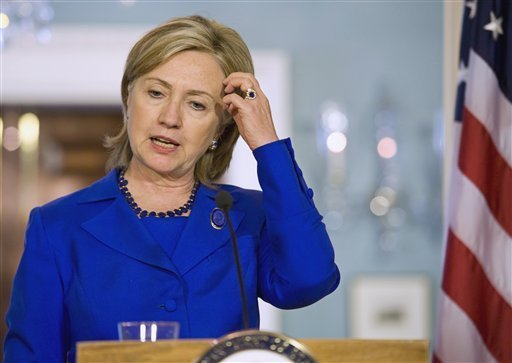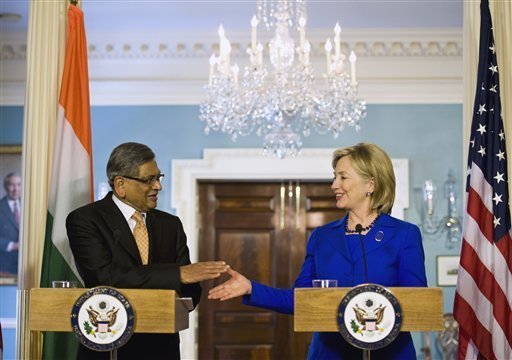 |
| Cliff Owen |
| Secretary of State Hillary Rodham Clinton speaks with reporters
following her meeting with Indian Foreign Minister S.M. Krishna, not shown, at the State Deptt. in Washington. |
President Barack Obama on Thursday called deepening ties with India one of his administration's most important goals. Announcing that he will visit the rising Asian power in early November, Obama said the U.S.-Indian relationship will help shape the coming century.
Obama's comments came during the inaugural U.S.-India Strategic Dialogue, a high-level meeting that is meant to ease Indians' fears that their country is slipping behind rivals China and Pakistan in U.S. interest.
"Our relations with India are at the highest of priorities for my administration and for me personally as president of the United States," Obama said at a reception at the State Department hosted by Secretary of State Hillary Rodham Clinton for her Indian counterpart S.M. Krishna and an array of U.S. and Indian officials. Obama called India "a responsible global power" and said the U.S.-India relationship "will be a defining partnership of the 21st century."
The Obama administration is working hard at this week's meetings to reassure India because the nuclear-armed country is an important player in many of the global issues the United States wants solved. India is seen as crucial to the U.S.-led fight against extremists in Pakistan and Afghanistan, as a counterweight to powerful China and as a big part of settling world trade and climate change deals.
The United States, Obama said, values India not merely for its crucial geographic position in South Asia but because of the deep social, political and strategic values the countries share. "India is indispensable to the future that we seek," he said.
U.S.-India ties were transformed after decades of mistrust when the administration of Obama's predecessor, George W. Bush, pushed through a landmark 2008 accord to establish civilian nuclear trade with formerly shunned India. Since then, however, India has watched with wariness as Washington forged deep bonds with Indian neighbors China and Pakistan.
Earlier Thursday, Krishna added a note of tension to the talks when he made a push for India to be allowed to interview an American citizen linked to the 2008 Mumbai terror attacks that left 166 people dead.
 |
| Indian Foreign Minister S.M. Krishna prepares to shake hands with Secretary of State Hillary Rodham Clinton following their meeting at the State Department in Washington |
Clinton did not publicly respond, and neither the State Department nor the Justice Department would comment on India's request. The American, David Coleman Headley, has pleaded guilty to scouting Mumbai before the attacks.
A major part of the talks dealt with extremists in Pakistan, both those fighting U.S. troops from havens along the Afghan-Pakistan border and those that India blames for the killings in Mumbai, which also is known as Bombay.
Clinton said the countries must "directly and candidly" address lingering doubts: "Doubts among some Indians that the United States only sees India, or mainly sees India, in the context of Afghanistan and Pakistan," Clinton said. "Doubts in America that India has not fully embraced its role in regional or global affairs."
Clinton also deflected a question about another sore point in New Delhi: The Obama administration's reluctance to support India's push to become a permanent member of the United Nations Security Council. She said only that the United States was "very committed to considering India" for membership.
Arun Kumar, IANS, [email protected] also writes:
Ties with 'responsible global power' India, top priority: Obama
Washington : Calling US-India relations as "one of the defining partnerships of the 21st century", US President Barack Obama said he plans to visit India in early November to together make "history and progress that will be treasured by generations to come".
"Our relations with India are at the highest of priorities for my administration and for me personally as president of the United States," Obama said at a reception Thursday at the State Department hosted by Secretary of State Hillary Clinton for her Indian counterpart S.M. Krishna after the inaugural US-India Strategic Dialogue.
"When it comes to building a future of greater prosperity, opportunity and security for people there is no doubt I have to go to India, but even more I am proud to go to India," he said.
"And I look forward to the history that we will make together, the progress that will be treasured not only by this generation, but by future generations to come."
The rare gesture of attending a reception at the State department was seen as a way to ease India's concerns that the US views ties with New Delhi through the lens of the situation in Pakistan and Afghanistan or through the prism of a rising China.
Obama called India "a responsible global power" and said the "unprecedented" US-India relationship "will be a defining partnership of the 21st century" that will help shape the future of the world on issues such as the economy and security.
"We value our partnership... because of what we share and where we can go together," he said, adding that the two countries share a vision of the future built on "security and prosperity".
Krishna too stressed the importance of the US-India relationship saying India can be a "dependable anchor of the region's growth".
Prime Minister Manmohan Singh, who had visited the White House on Obama presidency's first state visit in November 2009, Krishna said, had "asked me to reiterate the importance he attaches to this strategic dialogue".
"There are few relationships in the world that have so much potential as India-US relations, because, I believe, that our cooperation is not only for great mutual benefit, but is destined to have a strong impact on global peace, prosperity and stability in the 21st century," Krishna said.
The US, Obama said, values India not merely for its crucial geographic position in South Asia but because of the deep social, political and strategic values the countries share. "India is indispensable to the future that we seek," he said.
Earlier at a joint press conference with Krishna, Clinton echoing Obama's words about India as an indispensable partner said: "We believe that a rising India is good for the United States and good for the world."
"Our two nations, great democracies, dynamic and interconnected economies and engines of progress, understand that our fortunes in this new century are increasingly linked," she said.
"Our people are more connected today than ever before, and we face complex global challenges that will be difficult to solve without the United States and India working together," she said.
Noting that both India and the US have experienced violent extremists, Clinton said she and Krishna discussed the importance of India's leadership to promoting security, stability and prosperity across Asia and beyond. "Security is more than a priority, it's an imperative," she said.
Krishna said they had agreed that terrorist groups operate as a syndicate, leveraging each other's assets and strength, and are increasingly converging together on motivation and targets. "Hence, a segmented approach towards terrorism, especially in our neighbourhood, would not succeed."
India was pleased with the way the counter-terrorism cooperation between the two countries has progressed and that they have agreed to intensify it further, he said.
On Afghanistan, Krishna said India and the US have a shared convergent goal of a stable, peaceful, pluralistic and democratic Afghanistan, which protects the rights and the dignity of all sections of Afghan society. "India and the United States are partners in achieving these goals."

